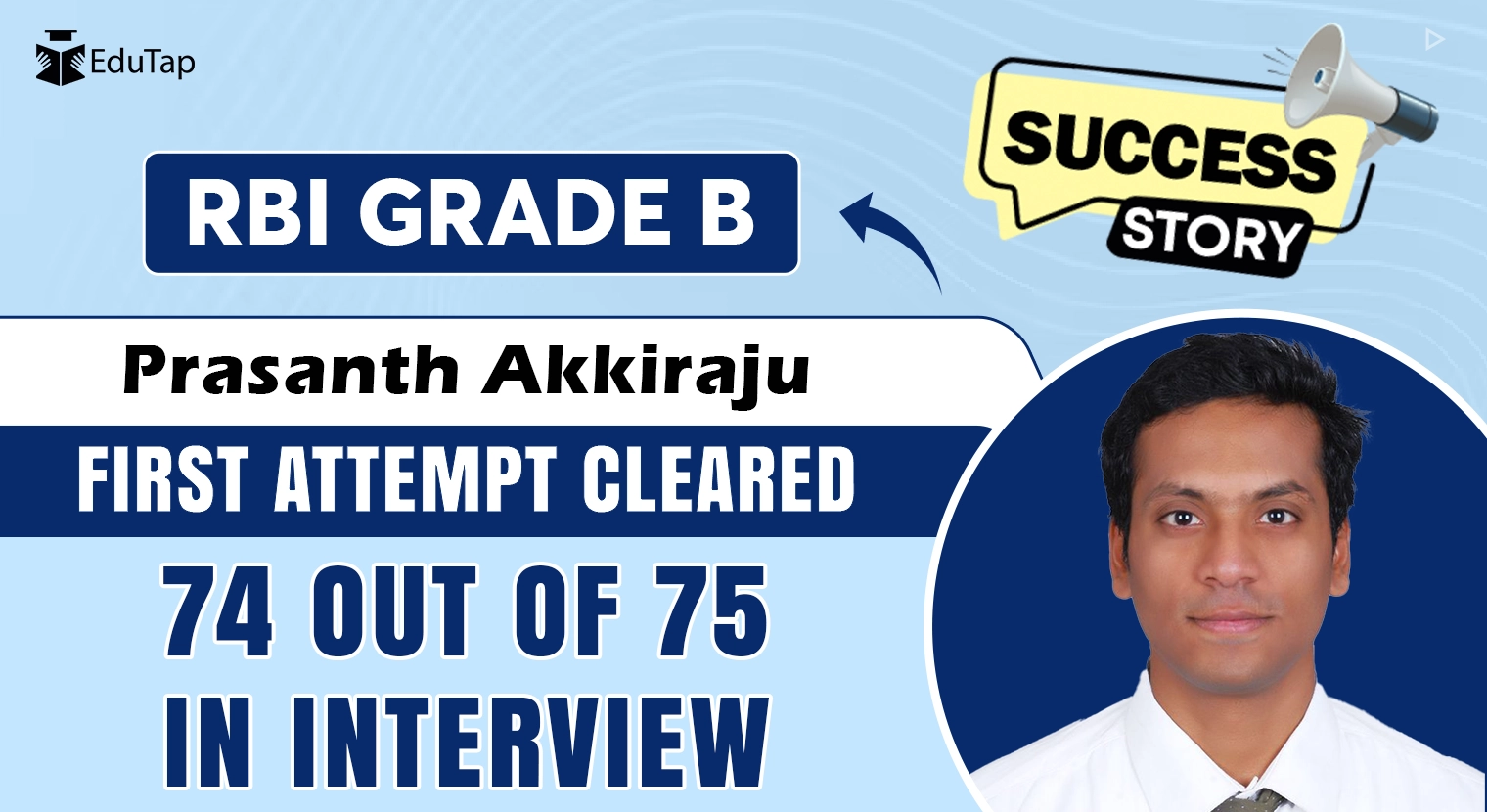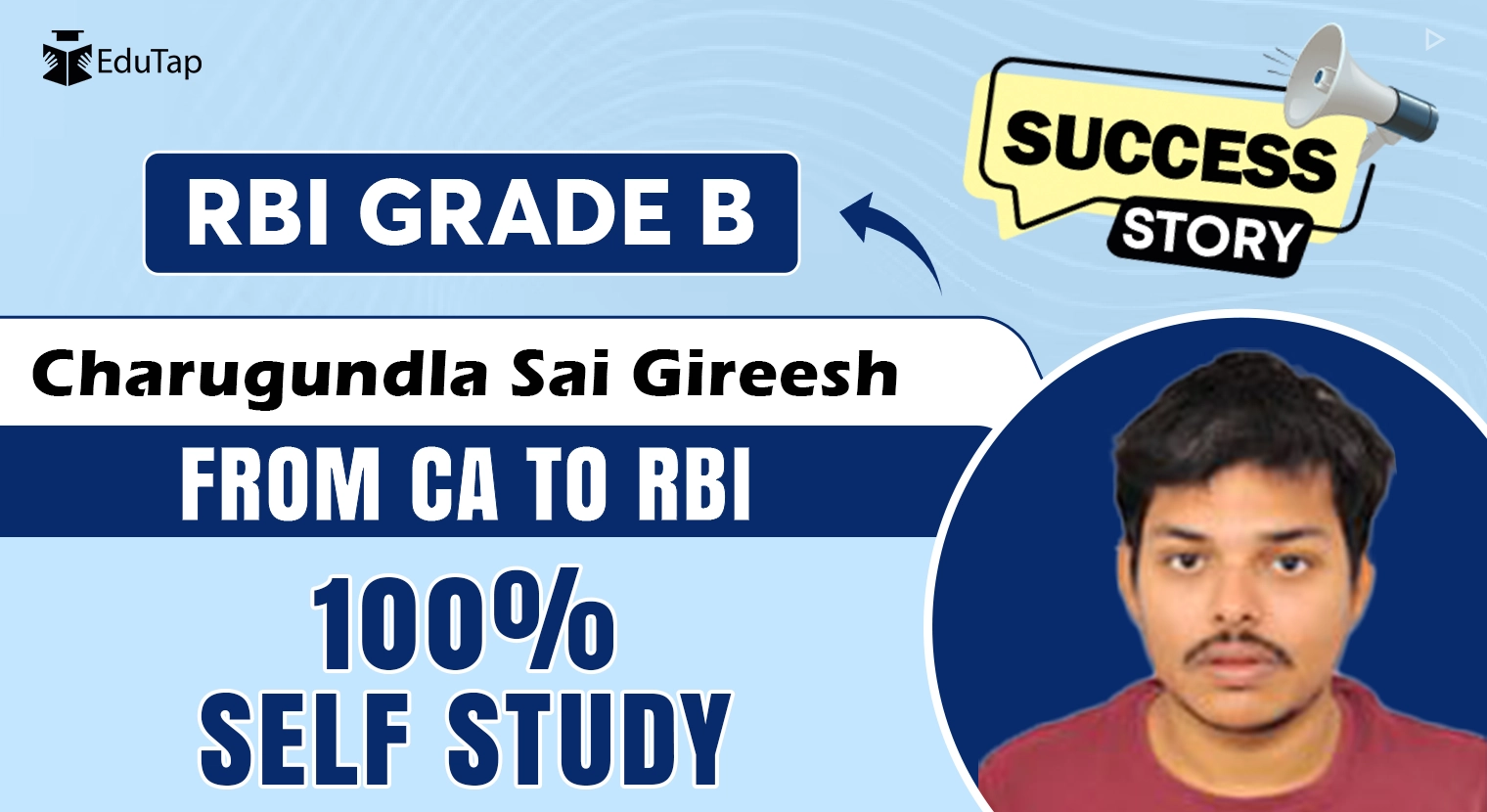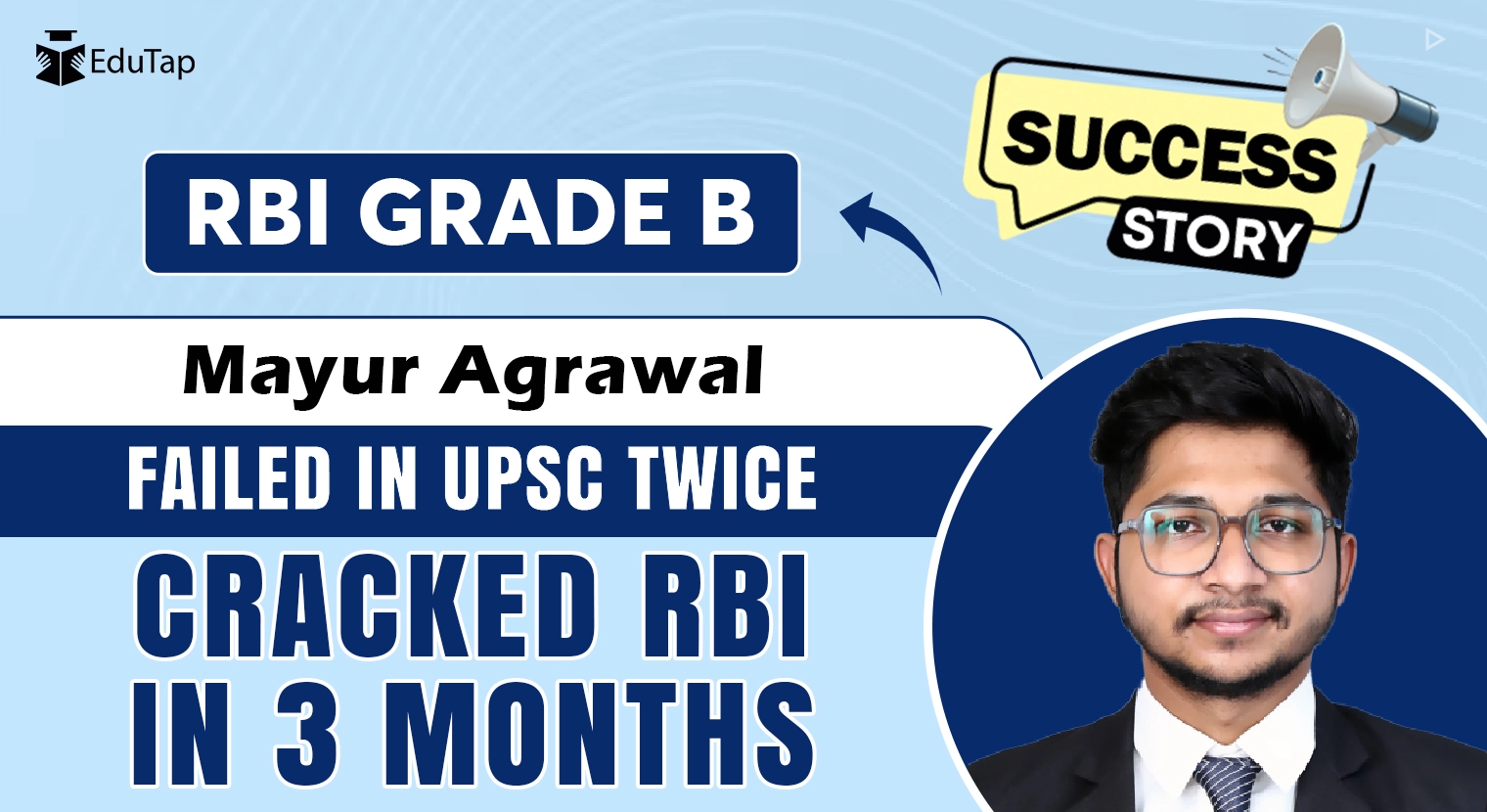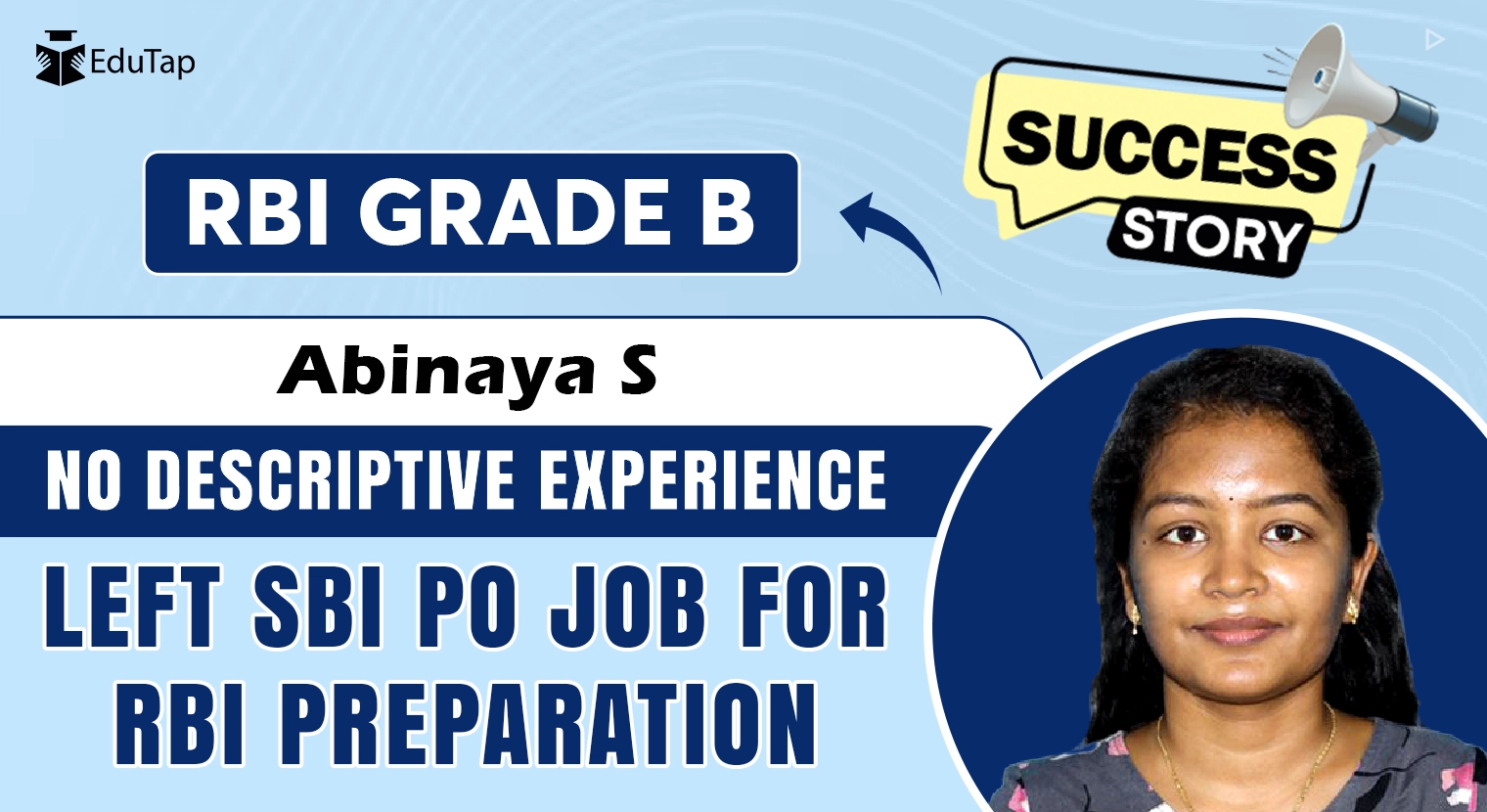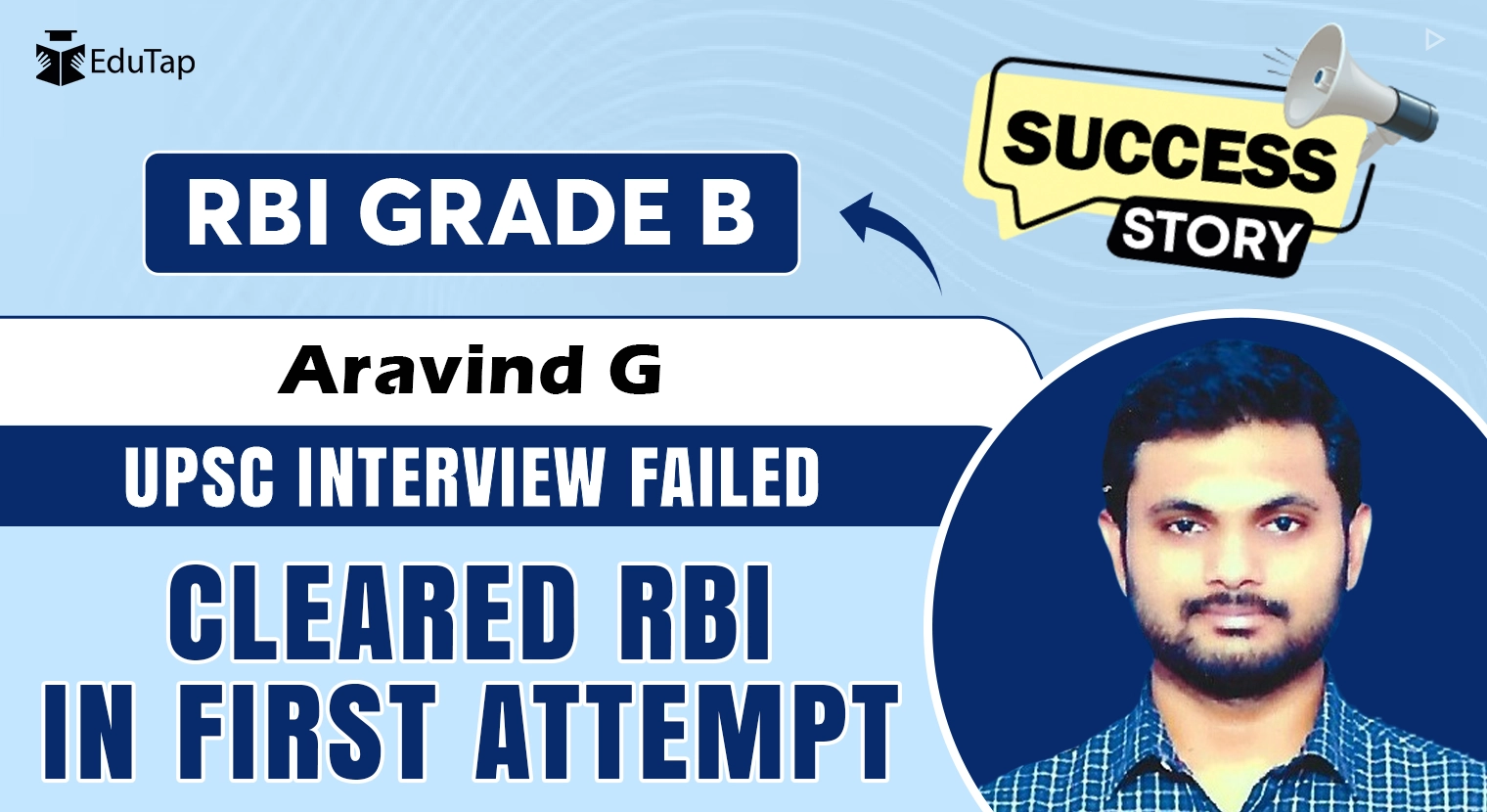Cracking the RBI Grade B exam on the first try is a dream many chases, but Mr. Prasanth Akkiraju turned that dream into reality. Despite limited preparation time, his strategic approach propelled him to achieve exceptional results, including a near-perfect 74 marks out of 75 in the interview stage.
In this article, Mr. Prashant shares his winning strategies for RBI Grade B Phase 1, Phase 2, and Interview.
Background
- Graduated with a B.Tech. degree
- Founded an NGO
- Preparing for the UPSC (since 2015)
Brief Introduction
I started preparing for the UPSC exam in 2015. After that, I had to take a break for personal reasons, but I got back on track with my UPSC preparation in 2021. After some time, I started preparing for the RBI Grade B exam, and my preparation lasted for around three months: 40 days before the Prelims, 30 days before the Mains, and 20 days before the Interview.
But in reality, my RBI Grade B preparation was more like a combined effort of all my previous studies, what I had learnt for the UPSC exam, and what I had picked up more recently while studying for the SSC exam. That’s the overall timeframe I took to clear the RBI Grade B exam.
My dedicated RBI Grade B Preparation lasted for three months only.

How I Came To Know About the RBI Grade B Exam
My introduction to the RBI exam began way back in 2012. Back then, in college, I participated in an interface program with Serbia. That sparked some early connections, and I remember using the beautiful RBI library in Hyderabad. I even had a bit of interaction with RBI managers at that time.
While the RBI exam held my interest, I didn’t seriously pursue it until 2021. That year, I was already studying for the SSC exams, and I noticed the overlap in the syllabus (quantitative reasoning, English, and general awareness) between the SSC and RBI prelims. At that time, I decided RBI was a great opportunity and started preparing for the RBI Grade B exam.
My preparation for the other exams and my interest towards the RBI organization took me to the RBI Grade B exam.
RBI Grade B Vs. UPSC & SSC
The descriptive portion of the RBI Grade B exam aligns closely with what the UPSC expects for their Mains paper. Similarly, the RBI Grade B Prelims section, which focuses on quant, reasoning, general awareness, and English, mirrors what the SSC expects you to study for the exam.
In that sense, the RBI Grade B exam is quite comprehensive. It covers everything: aptitude, objective general studies, descriptive writing, typing skills, and even an interview. I think there’s no other exam that is as exhaustive as RBI Grade B is.
The descriptive portion of the RBI Grade B exam aligns closely with UPSC and Prelims aligns with SSC.
My RBI Grade B Marks
I scored very well in the interview, achieving 74 marks out of 75. Another candidate also scored 74 that year. The interview marking might have been more generous than in previous years.
Some of my colleagues mentioned that around 15% of them received marks exceeding 65 to 70. They felt the marking was more lenient that year as compared to last year, where the lowest score someone received was apparently 3 out of 75. That wasn’t the case in 2022.
In the RBI Grade B Mains, I scored 177+. So, by combining my MAins and Interview scores, my total comes to around 250.
I scored 177+ in the RBI Grade B Mains and 74 in the interview, making my total around 250.
My RBI Grade B Phase 1 Preparation Strategy
I only dedicated 25 days to studying for the RBI Grade B Phase 1. Part of the reason was some concern about the finance and management section. So, for the first 20 days, I devoted 50% of my study time specifically to finance and management.
My RBI Grade B Quant and English Strategy
Quant seemed manageable, and my English skills were already decent. However, the reasoning section was one of the toughest I’d encountered in Indian exams.
My RBI Grade B Reasoning Strategy
For the reasoning section, I realized the importance of timed practice. I used a stopwatch to track my progress. After studying a chapter, I’d time myself solving 10 practice problems. Then, I’d redo the same problems to see improvement. I repeated this process until I felt confident before moving on to the next chapter.
My RBI Grade B General Awareness Strategy
For general awareness, I focused on current affairs. To stay updated, I used EduTap, AffairsCloud, or similar resources. Additionally, I studied the static portion related to banking. To help with memorization, I created summary sheets.
For example, on an A4 sheet, I wrote awards, nominees, banks in the news, recent financial news, etc. These concise notes are basically one-word summaries, which helped me refresh my memory efficiently a day or two before the exam and avoid confusion between answer choices.
I used EduTap, AffairsCloud, or similar resources to stay updated on the current affairs.
My RBI Grade B Revision Strategy
Unfortunately, I didn’t have a lot of time for revision. However, I firmly believe revision is just as important as studying itself, especially for General Awareness. If you don’t revise, it’s basically the same as not studying at all. So, I revised it as often as possible.
Ideally, if I studied something today, I’d try to revise it within three or four days to solidify it in my memory. Make sure you revise it from the same source and do not just re-read it all. Everyone knows the importance of revision, but the real challenge lies in following through. You need to step out of your comfort zone.
Stop what you’re studying, close the book, and then go back to what you read yesterday. Revise it actively, then return to your current studies. I’ll admit it takes a bit of courage. Those enticing books can easily tempt you to keep studying new material, but you must resist that urge.
If I studied something today, I’d try to revise it within three or four days to solidify it in my memory.
RBI Grade B Phase 1 Preparation Tips
The RBI Grade B exam doesn’t require exceptionally high scores in Phase 1. The key is to focus on increasing your existing strengths to comfortably clear the cut-off. Only your strong areas contribute to the overall cut-off, so spending excessive time on weaknesses might not be the most productive strategy.
For Quant, Reasoning, and English, my suggestion would be to strategically leave behind your weak areas. If you have four or more months for the exam, you can go ahead and strengthen your weak areas.
However, once the RBI Grade B notification is released and you have roughly two months remaining, it can be strategic to stop focusing on weak areas. This might sound harsh, but it makes sense in the context of clearing the RBI Grade B Prelims cut-off. The Prelims is all about clearing the sectional and overall cut-offs.
If you are strong in one subject, say General Awareness (I think everybody is good in GA), what truly matters is strategically leaving behind weak areas in Quant and Reasoning. Then, focus on those five or six questions in each section where you are strong. You can effectively clear the RBI Grade B cut-off by mastering your strong areas and minimizing errors.
You can effectively clear the RBI Grade B cut-off by mastering your strong areas and minimizing errors.

Importance of RBI Grade B Mock Tests
The RBI Grade B Prelims requires a different skill set. You need to evaluate yourself to understand your strengths and weaknesses. This involves managing risk by strategically attempting and avoiding questions, and understanding how to approach different answer options. Mock tests are excellent tools for developing these skills.
However, the RBI Grade B Mains is a different level. Here, consistent effort and thorough revision of each chapter are key. With only one month of preparation time compared to the UPSC’s three months, the focus should be on revision.
Here’s my recommendation:
- If you’re a first-time aspirant or haven’t completed the syllabus, prioritize revision before attempting mock tests.
- For second or third attempts, or if you’ve already covered the syllabus, mock tests can be valuable for practice.
Revision is the cornerstone of RBI Grade B Mains preparation, while mock tests can be a helpful addition for experienced candidates.
My RBI Grade B Phase 2 Strategy
Here is my RBI Grade B Phase 2 strategy:
My RBI Grade B Descriptive Strategy
I left certain questions unanswered in the exam hall and couldn’t complete the entire paper. Despite that, I still managed to score reasonably well, leading me to believe that my writing was strong.
Anyone I told about leaving questions unanswered advised me to lower my expectations and try again next year. However, things turned out differently. I was confident in the content of my answers. I truly believed in what I had written. In my opinion, the RBI Grade B Mains exam is all about knowledge, not just information recall. It’s crucial to process the information you’ve learned and apply it effectively at the right time.
I remember incorporating many quotes in the English descriptive section. I also used anecdotes and even data points in the ESI (Economic & Social Issues) section. While processing information is certainly important for the Finance section, I believe the descriptive portion is more about demonstrating your knowledge and applying it creatively.
The RBI Grade B Mains exam is all about knowledge, not just information recall. It’s crucial to process the information you’ve learned and apply it effectively at the right time.
My RBI Grade B Objective Strategy
I found that success came down to information processing for the objective part of the RBI Grade B Phase 2 exam, particularly in finance and management. You’re bombarded with a lot of information, and the key is to retain it effectively and then apply that knowledge during the exam. This approach worked well for me in finance and management.
However, for the ESI section, the exam seemed to be becoming more abstract and unpredictable, not necessarily more difficult, but definitely less straightforward. For ESI, instead of rigidly following a specific syllabus, I found it more beneficial to read a wider variety of materials and try to connect the dots between seemingly disparate pieces of information. The goal then became strategically eliminating answer choices based on the information presented in the question.
Honestly, in the ESI objective section, nobody can give a very good attempt. All you can do is not to give a bad attempt, so just do reasonably well that’s enough in ESI unless it’s a very easy paper so all your game lies in the descriptive part. Your true potential lies in the descriptive portion.
Therefore, focus your preparation on practicing descriptive writing. If you diligently practice writing, you already know its importance. Many people who prepare for UPSC or bank exams understand the crucial role of clear and concise communication.
Typing Strategy for RBI Grade B Descriptive Writing
Since I’m a computer science graduate, I had a decent typing speed, so I didn’t practice specifically for the exam. However, I noticed some people focused more on practicing writing answers than typing itself. It’s important to remember that writing and typing are two distinct skills. Formulating and expressing your thoughts clearly (writing) is different from physically typing those words (typing).
Here’s how you can practice tying:
- Start by typing about something familiar and comfortable.
- Perhaps answer a prompt like “How was your day?”
- Just type a page or so about random things.
Many RBI Grade B Mains candidates, especially those with a banking background, may not have strong writing skills. For them, a helpful exercise could be daily journaling. Write about your day, family, friends, a book you read—anything that allows you to express yourself freely.
Focus on non-subject-specific topics first to gain momentum. Then, practice subject-specific topics.
Formulating and expressing your thoughts clearly (writing) is different from physically typing those words (typing).
My RBI Grade B Strategy for Descriptive English
Choosing which topic to start on first—essay, precis, or RC—should depend on your strengths. To identify your strengths, practicing with past exam papers is highly beneficial. Attempting at least two papers before the RBI Grade B Mains will help you identify your strengths and weaknesses. For example, some candidates may excel in essay writing, while others may find it difficult.
Regardless of the question prompt, prioritize writing about topics you feel comfortable with. If a particular topic doesn’t resonate with you, address it last. The order in which you choose to answer the questions is less important than approaching them with confidence.
The difference between success and failure comes down to confidence. A candidate who attempts the RBI Grade B exam with confidence is more likely to perform well than one who is scared. Focus on what you know well, and address the less familiar topics later.
My RBI Grade B ESI Strategy
I covered a significant amount of current affairs, likely due to the unpredictable nature of the ESI exam. Six months of preparation for current affairs seemed reasonable, considering the element of surprise often present in the question paper. The goal was to be familiar with various current events for maximum preparedness.
I paid particular attention to schemes, understanding their importance even if they seemed outdated. Exam questions can sometimes reference schemes announced just a month before the exam. To ensure comprehensive coverage, I consulted various sources, including Ministry websites, Vision IAS materials, EduTap, and others. There’s no one specific source for the ESI paper.
While the RBI may not be heavily emphasizing static questions recently, it’s still important to be prepared for them. They could still ask such questions in the RBI Grade B exam. Furthermore, a strong foundation in static knowledge can enhance your ability to write descriptive answers. In the descriptive portion, what you write reflects not only your knowledge but also your personality.
For example, defining unemployment shouldn’t require a full paragraph. Using five to eight well-chosen words is ideal. A lengthy definition indicates a lack of understanding of core concepts. Therefore, a strong grasp of static knowledge translates to stronger descriptive answers.
In-depth economic knowledge isn’t necessarily crucial. For example, I haven’t touched an economics textbook since studying for the SSC exam in 2018, yet I haven’t scored poorly in the ESI section. This suggests that diving deep into economics may not be essential.
However, a foundational understanding of static knowledge is still important. Being able to differentiate between growth and development, for instance, or understanding the various types of unemployment (rural vs. urban unemployment) demonstrates a basic grasp of key concepts.
RBI Grade B ESI Preparation Tips
Don’t view the RBI Grade B syllabus as a Bible. While covering the syllabus is crucial, there are ways to make your preparation more innovative.
For example, instead of simply studying generic unemployment information, explore what industry experts such as Amartya Sen or Abhijit Banerjee have written on the topic. Including these unique perspectives can significantly enhance the value of your answers. Even in questions worth two or three marks, a single innovative insight can make a big difference.
Instead of studying generic ESI topics, explore what industry experts such as Amartya Sen or Abhijit Banerjee have written about them.
My RBI Grade B Finance and Management Strategy
EduTap was a valuable resource for my Finance and Management preparation. They provided helpful notes and summary sheets on the subject. Additionally, I followed EduTap’s RBI notification summary to stay updated on exam details. Given the limited time for preparation, I chose to study mind maps for Finance and Management. I built upon EduTap’s existing mind maps, adding my own notes and information. Ultimately, I condensed each chapter into just three or four pages of material.
This approach may not be typical for state government exams, where time is less of a constraint. However, the RBI Grade B exam, with its tight timeframe, amplifies the importance of concise notes. After initially reviewing the summary sheets, I further condensed them into mind maps. In the final two days before the exam, I focused solely on revising these mind maps, discarding the summary sheets. Essentially, mind maps became my primary study tool.
EduTap was a valuable resource for my Finance and Management preparation. Their notes and summary sheets were really helpful.

My RBI Grade B Current Affairs Strategy
When I began preparing for the RBI Grade B exam, I knew I was at a disadvantage compared to many candidates who had been studying for months or even years. Some were on their second, third, or even sixth attempt, like a colleague of mine. Knowing the seriousness of the exam, I understood the need for dedicated preparation.
While I don’t recommend it, I started reading newspapers only one or two months before the exam due to time constraints. It wouldn’t be my ideal advice, but my situation demanded it. For those who can plan ahead, starting newspapers much earlier would be a significant advantage.
I incorporated multiple resources into my current affairs preparation. I read physical copies of newspapers before the RBI Grade B Mains exam. For the interview, I relied on online news sources, such as the Economic Times, Business Standard, Financial Express, and Business Line. I would read them regularly and take detailed notes, focusing on the information and expert opinions and analyses.
My RBI Grade B Interview Experience
I think the interview panel consisted of five to six members, one of whom was a female member from South India. There was also one dashing member. Honestly, I can’t recall the names of any of the panelists, including the chairman. However, I do remember that he was the chairman, as he sat in the center and seemed quite senior.
I knew nothing about the panel, but they were cordial. However, they are ready to correct you if you make a mistake. They wouldn’t hesitate to point out an error; in my case, the chairman even scolded me. I had used an acronym, and he made it very clear that using acronyms during professional interactions is unacceptable, even on an international platform. I apologized and said I’ll make a note of it.
Despite their seriousness, don’t let the panel intimidate you. They will scold you but you can not look fearful. The fundamental point is that they are testing your personality, perseverance, and your ability to perform under pressure. They may ask challenging questions or try to fluster you, but that’s part of the process. They want to see how you handle uncertainty.
Interview boards are never partial. Their objective is clear: to ask you only those questions you don’t know. Their goal is clear, and it is important for you to have a clear objective as well. You’re both there for a reason. They have their job to do, and you have yours.
The panel is ready to correct you if you make a mistake. Despite their seriousness, don’t let the panel intimidate you.
Mistakes I Made During the RBI Grade B Interview
There were two such instances. The chairman asked me not to use any acronym, So, I immediately said, “I’m sorry sir my mistake I’ll make a note of it”. After this, we continued the interview. But then I said, “I had used the acronym DWCRA and I was about to explain it, sir”.
The other kind of interruption they did, where the mistake was not actually mine, but still they interrupted me and put me down. If you make a genuine mistake, acknowledge it, there is no harm in that. However, if the mistake is not yours, which happened to me, take a stand, as there’s nothing wrong with it.
Fundamentally there’s only one point that we are very energetic and young and they are kind of elderly people who wanted to know us. For example, during one question, a board member said that agricultural marketing was more important than agricultural productivity. I politely disagreed, stating that productivity is more important than marketing.
To illustrate my point, I gave an example. I mentioned a farmer who prioritizes growing exceptionally bright red apples. While these apples may be visually appealing to consumers and retailers in the first year, the unsustainable practices used to achieve this intense color will deplete the soil’s nutrients. By the third year, the yield will likely decline significantly, potentially forcing the farmer to leave the land fellow and also face financial losses from decreased production and potential insurance issues.
This example highlights the crucial role of agricultural productivity. Even with a well-established marketing channel, if the underlying production is unsustainable, long-term success is unlikely. We discussed this example for about 30-40 seconds. The initial silence from the panel surprised me, but then I noticed their attentiveness. The South Indian lady leaned forward, nodding in agreement with my explanation. Their interaction solidified my belief that they wanted meaningful conversations with candidates. The key was to make the conversation interesting and engaging.
If you make a genuine mistake, acknowledge it, there is no harm in that. However, if the mistake is not yours, take a stand, as there’s nothing wrong with it.
RBI Grade B Interview Preparation Tips
I wanted to share two key points.
- First, I read a lot of newspapers before the interview. Even though no questions directly came from the news, it boosted my confidence. Walking into the interview hall with a big smile, and leaving with an even bigger one, felt great. Reading newspapers creates a sense of shared knowledge. The interview panel likely read the same papers you did recently. It’s almost like having a leaked question paper. So, my advice is to read at least two to three business or financial newspapers before your interview.
- Secondly, my interview heavily focused on my biodata, with only a couple of exceptions. Therefore, honesty is crucial when filling it out. I know many people try to embellish their biodata to impress interviewers, but there’s a strategic way to approach it. Interviews aren’t about being 100% truthful but rather about being able to confidently defend what you’ve written. You can write creatively, but be prepared to back it up. For example, claiming you worked at NASA sounds impressive, but they probably won’t ask for verification. Instead, they might ask about your role, motivations for working there, and why you left. Only include things you’re comfortable elaborating on.
I prepared six drafts of my biodata and had many people review it. They suggested minor changes, like replacing ‘fine art photography’ with just ‘photography.’ While photography is a hobby, I wanted a more specific term to spark conversation during the interview. Carefully crafting your biodata can steer the conversation and showcase your personality. It feels like you’re leading the interview, not the other way around.
Your biodata is a constitution, and the interviewers are agents of the constitution. Of course, it’s not a literal interpretation, but it highlights the importance of your biodata in shaping the interview.
How to Justify Gap Years in RBI Grade B Interview
They asked me a question about my gap years and all the different activities listed on my resume. Specifically, they said, “You did social welfare work, then pursued a B.Tech. degree, then went into marketing, founded an NGO, and now you’re interested in banking and financial economics. Do you have any clarity in your life? Haven’t you wasted a lot of time?”
Here’s how I responded:
“Sir, I viewed these experiences as a way of exploring different career paths. This was the prime time in my life to experiment, between the ages of 20 and 27. You can not ask someone to just pick a camera and become a photographer at 40. So, that was my time to explore, and I did. There’s nothing wrong with that. The only regrets should be for things that made you ashamed. If you are happy about something, like preparing for the UPSC, then say it. There’s no shame in admitting you pursued it, even if you didn’t make it. Focus on what you gained during that time. You can even bring up personal topics.
Understand the Outcomes of Gap Years
There are only two outcomes for gap years: either you did something you’re ashamed of, or you did something you’re proud of. If you’re proud, write about it in your biodata and explain the value it added to your personality. If there’s something you regret, you need to cook up some story time to divert their attention. This is a delicate part, so be strategic. If you had other strong areas on your resume, you didn’t need to dwell on this. However, if your resume was a bit plain, then use it as a tool to attract the interview board’s attention.”
Importance of RBI Website for Interview Preparation
While there weren’t any direct questions from the website, the questions on finance and management did come from a similar vein. However, they focused more on older topics rather than new ones. Reading summaries from EduTap or getting current affairs updates on finance in the news from other institutes can be helpful; however, it is not the only approach.
They emphasized the importance of understanding the core concepts. If you don’t understand something, such as the concept of labor or how it differs from Indian standards, it’s crucial to research it on Google. Understanding the fundamental basics of everything is key to formulating strong answers.
RBI Grade B Exam Preparation Tips
Prepare with dedication! While everyone makes mistakes, it’s the constant self-evaluation and correction that leads to success. You’ll intuitively know what’s needed once you’re truly committed.
Let me share a personal anecdote. Just three days before my exam, I printed out 200 pages of material. It wasn’t easy, but the exam demanded it. I hadn’t studied it before, so I pulled an all-nighter fueled by coffee. Over those three months of intense preparation, I even lost seven kilos! It takes a genuine desire to go beyond your comfort zone and break your habits to achieve your goals.

Here is a video in which Prasanth Akkiraju explains his RBI Grade B preparation strategy.
Conclusion
Mr. Prasanth Akkiraju’s journey to RBI Grade B success is an inspiring story of dedication, smart planning, and focused preparation. In just three months, and on his first attempt, he conquered the RBI Grade B exam by utilizing effective study techniques and focusing on his strengths. By learning from Prasanth’s experience, including the mistakes he made and overcame, you can develop your own personalized path to a successful RBI Grade B journey.
